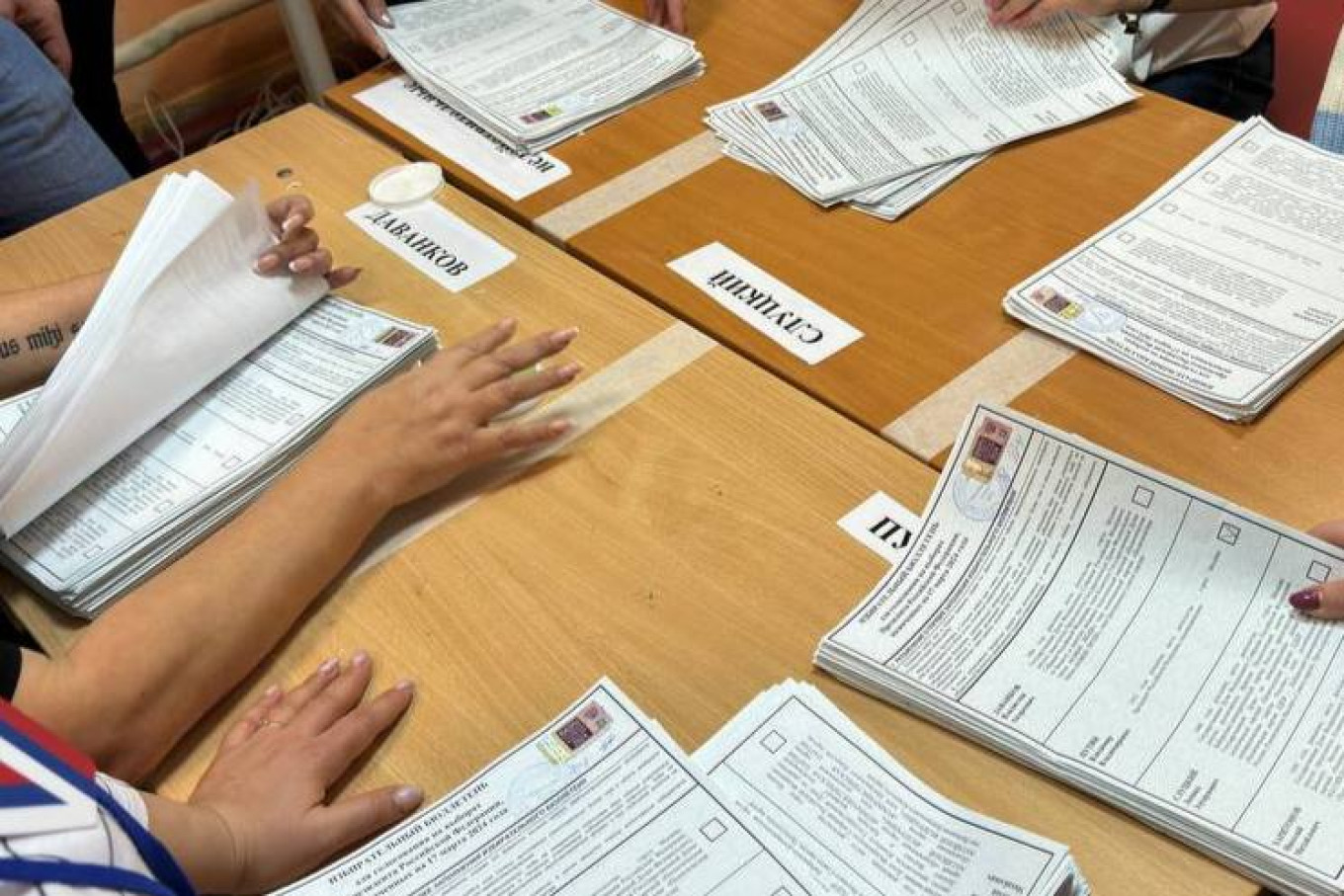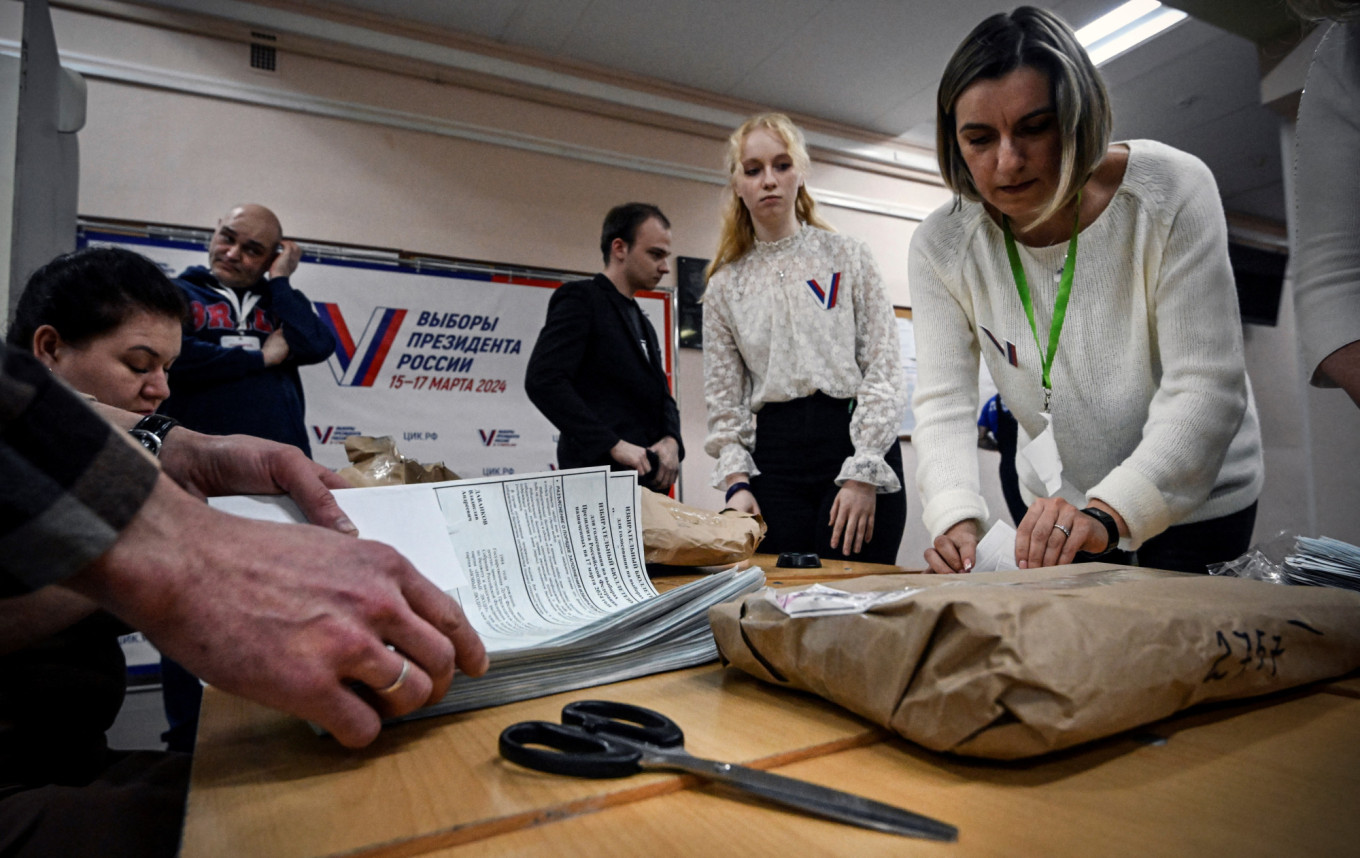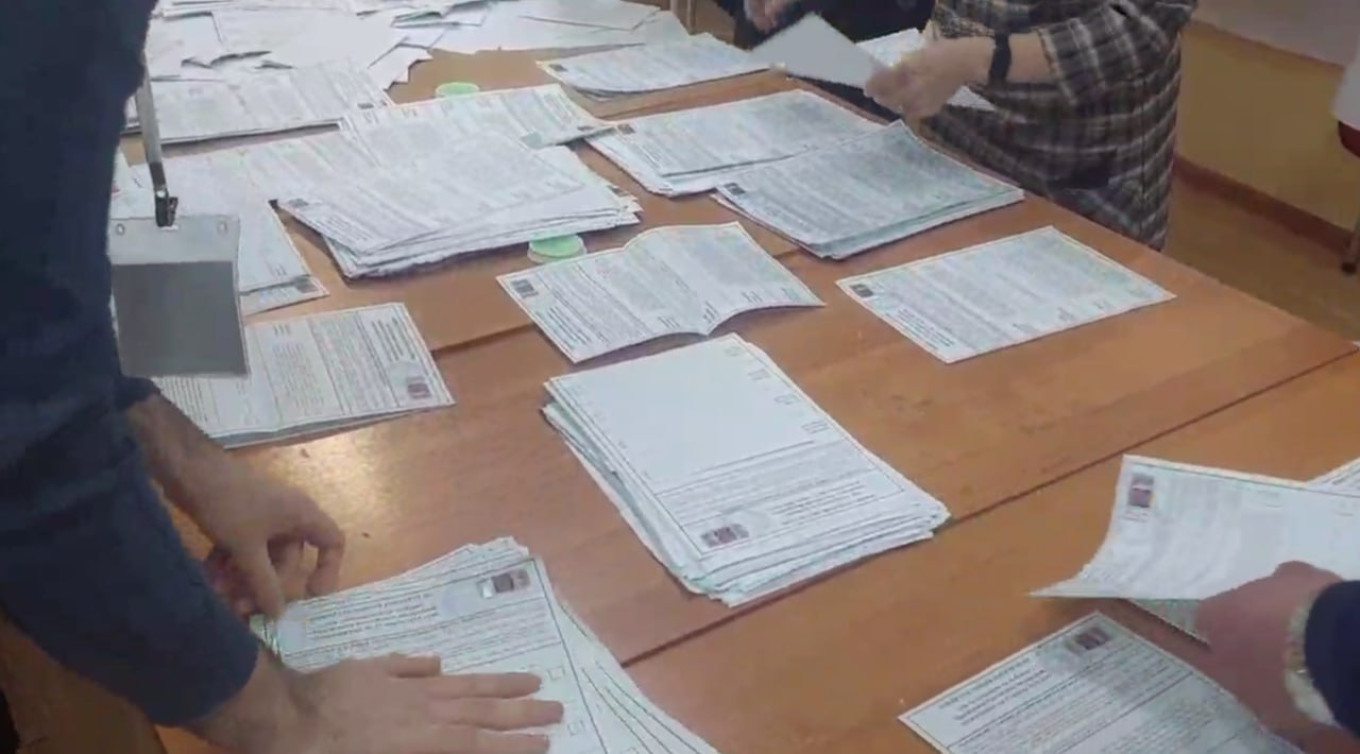MOSCOW — More than a dozen election observers who spoke to The Moscow Times reported widespread errors among election commissions in Russia’s 2024 presidential election, including falsifications of results and violations of election rules.
In the lead-up to the March 15-17 vote, there was little doubt that incumbent President Vladimir Putin would secure a fifth term in the Kremlin after changing the Constitution and leading an intensified crackdown on the opposition and dissent.
With 87.28% of all votes going to Putin, the Kremlin can now claim that the nation is behind Putin and his two-year war on Ukraine.
But experts suggest that millions of votes cast for Putin may have been manipulated to guarantee his victory in the three-day vote — a newly introduced format that critics warned could make it easier to falsify results.
His rivals, who were seen as handpicked placeholders, received a marginal number of votes, according to the results from Russia’s Central Election Commission (CEC). Communist candidate Nikolai Kharitonov came second with 4.31% of the vote, while New People’s Vladislav Davankov and nationalist Leonid Slutsky pulled in 3.85% and 3.20% respectively.
Seventeen election observers from Moscow, St. Petersburg and Russia’s regions described to The Moscow Times violations of varying severity at their polling stations, where they monitored both the voting and the vote-counting process.
The CEC said it has no information about cases where voting results were declared invalid. But of the 17 election observers interviewed by The Moscow Times, 11 said that violations at their polling stations led them to question the vote-counting results.
In some cases, election observers described open falsification of the results and cases when the names of the candidates and their results were mixed up “by mistake.”
Six observers said they believed that the results of votes at their polling stations were counted correctly. Still, they also reported witnessing mistakes in election procedures at their polling stations.
Falsification
In Moscow, two election observers described to The Moscow Times falsification of votes at their polling stations, saying that local election commissions put wrong results in the final documents.
Artyom Guselnikov, who worked as an observer at Moscow polling station No. 205 on Saturday and Sunday, said that after the polls closed, the observers and the commission “counted the ballots” and “agreed on the results” — but the election commission did not put the results in the final document and “waited for around an hour.”
Then, “after a phone call to an election observer from Russia’s Civic Chamber,” the election commission “faked” results in the final documents and ignored the election observers, who had the right to check the documents and the results, Guselnikov said.
Guselnikov, who filed an official complaint regarding the results at the polling station No. 205, said that 152 votes for Putin were added and 37 votes were stolen from Davankov — the candidate who was considered as an “alternative” for some opposition Russians because of his stance on negotiations with Ukraine.
Similarly, Moscow election observer Alyona said that the local election commission at her polling station also refused to immediately record the results in the documents after the votes were counted.
“After around two hours,” the commission changed the results, adding votes for Putin and “stealing” votes from Davankov, said Alyona, who asked that her name be withheld due to security concerns.
In the official results, according to the observer, 70 votes were stolen from Davankov and 88 votes were added to Putin at that polling station.
“I asked them to recount the ballots and said it’s a criminal offense [to fake the votes]. No one reacted to me and I called the police,” Alyona said.
The observer called the police twice regarding falsification, but no officers arrived.

Video screenshot: Alyona to MT.
But later, two men from the higher election department came to the polling station, locked themselves in a room with the local commission members and discussed the results.
“It seems as if they wanted to correct [the results] but they failed — it turned out that there were more ballots from the ballot boxes in total than were originally issued to the [election] commission,” she said. “They recounted the invalid ballots, recounted something else…but they couldn’t match the numbers.”
“The two men also asked the commission deputy to show them his note with the original count and the numbers matched my calculations. They even read the numbers out loud to the entire commission, so everyone who wasn’t aware of what was going on realized that there was in fact a falsification,” Alyona said.
“I wrote down those numbers they discussed and they matched with my calculations — Putin had 545, Davankov — 152,” she said.
Later, three women arrived and “asked the commission to sign a fake protocol,” Alyona said.
The commission, Alyona said, also violated standard procedure during the vote-counting process. Instead of counting the votes sequentially, it divided all the ballots into groups and distributed them among seven commission members. When Alyona tried to file a complaint, the commission head “refused to sign” it.
Critics say this kind of violation creates opportunities for falsification, making it harder for election observers to check the ballots and the results.
At least five election observers from St. Petersburg and three from the Moscow region told The Moscow Times their local election commission manipulated the results intentionally or put down “wrong results by mistake.”
At polling station No. 723 in Ivanteyevka in the Moscow region, “it seemed that everything was violated and did not comply with the law,” local election observer Polina Barinova told The Moscow Times, describing the vote counting.
She and her colleague Fyodor Chernyshev, who worked as an observer at the same site, told The Moscow Times they were unable to properly check how the commission counted the ballots.
“While counting, they simply put a stack of ballots into the pile for Putin,” Chernyshev said, citing another observer at the site who was able to observe the incident.
Neither the commission head nor its other members announced which candidate’s votes were being counted as is required by procedure, Chernyshev said. The voting results were also not announced after the counting, he added.
“Well, at least they didn’t wipe themselves with those ballots, as one of my friends said,” Chernyshev told The Moscow Times.
Barinova called the counting procedure “completely opaque.”
“If they have nothing to hide, why would they behave this way?”

Alexander Nemenov / AFP
Breaches of voting and counting regulations
At least three observers from St. Petersburg and the Moscow region said that while they didn’t witness falsification, stuffing of ballots or manipulation of the numbers, they questioned their polling station’s results due to “procedural violations.”
One St. Petersburg observer, who requested anonymity, said that at the start of the final day of the vote she noticed that when the commission opened the safe where the ballots were stored overnight, the ballots were positioned differently than they were when the safe was sealed the previous night.
When she compared the photos of the safe from Saturday and Sunday and asked the commission to explain the difference, she was ignored.
“I did not observe any ballot stuffing, but I have a suspicion that instead of stuffing, there might have been a replacement of ballot packages or an unauthorized opening of the safe,” she said.
“What happened with the ballot packages, what happened with the ballots, only God knows.”
The observer said she was also barred from checking the opening of ballot packages and the manifest of voters.
“Perhaps everything is fine and fair there, but the procedural violations strongly cast doubt on this,” she told The Moscow Times.
Alexei Golyshev, an observer from Mytishchi in the Moscow region, said he filed four official complaints regarding violations at his polling station.
“I can’t definitively say whether the result was rigged because I can’t be certain,” he said, but the commission made it impossible to verify the accuracy of the count because members were checking the ballots simultaneously — in violation of the election rules.
At least four election observers also told The Moscow Times they believe that voters who work for the state were forced to cast their ballots on the first day of the three-day vote, with some workers asking to take photos at the polling stations to send to their bosses.
Pressure
Out of sixteen observers who spoke to The Moscow Times, only one stated that they had not experienced pressure or been barred from checking the voting and vote-counting processes.
Ivan, an observer from Mytishchi, said “the commission behaved appropriately” and there was “a cooperation,” adding, however, there were “minor violations” at the site.

Video screenshot: Danil Zimin to MT.
Others — like Danil Zimin, an observer from Odintsovo — described being prevented from checking the vote-counting process by members of the local election commission.
Some observers said they were forced by commission members to stay in one particular spot at their polling stations which made it harder to monitor the vote.
According to Golyshev, he was removed from the polling station for no reason when the bags of ballots were opened.
Gusenkov and Alyona from Moscow said that the election commissions even “threatened them” when they were trying to monitor their work.
“They told me that I’m disrupting the elections, that I’ll be detained and that I cannot film anything [at the station],” Alyona said.
“I didn’t feel safe,” she said.
Lack of knowledge
At least four observers who spoke to The Moscow Times also complained that members of the election commission lacked knowledge of Russian election law.
“Most of the errors were not due to some hypothetical directive from above, but rather due to the workers’ complete lack of care. That isn’t malicious intent, it is unprofessionalism — most of the violations are directly linked to this,” said one observer from St. Petersburg, adding that “two candidates were swapped” at her station.
“The number of votes was correct, but they were put under the wrong names,” she said, adding that she would file a complaint and she believed it was “a mistake.”
Zimin said the problem is that members of election commissions “are usually budget employees, who don’t want to do everything correctly and according to the procedure, but rather want to come home early.”
“No one cares there,” he said.
Gleb, an election observer from the Moscow region, who didn’t share his surname said that he was “shocked by the poor knowledge of the election commission members about the details of the election organization procedure.”
“The fact that commissions act so arbitrarily and with a desire to speed up the process diminishes transparency, creates potential for deliberate irregularities, and results in errors in counting,” he told The Moscow Times.
“Even the absence of fraud does not make elections truly democratic.”

